In the transcendental year of 1999, it became clear to me that I was extremely cool.
No, that’s a lie, please don’t take that declaration even remotely seriously. I was twelve and thirteen years old in 1999, and no new teenager understands coolness on a base level, much less feels that coolness in their still-growing bones. The effortlessness of cool is not something that any tween can hope to emulate, the style inherent in the word “cool” has not yet developed by that age. So I was not cool. But there are now two solid decades between me and that year, and on reflection, I’ve realized something momentous:
1999 was the year when I got a glimpse of my future. And I’m pretty sure I’m not the only one.
If you asked me point blank, I’m not sure I could pinpoint a time in life when the words “nerd” or “geek” were affixed to me, or even when I learned what they meant. There were a range of odd stereotypes that accompanied this identity, many that I had never experienced for myself—I was never stuffed into a locker, I never bonded with my friends via long hours playing video games or DnD, I was never been publicly ridiculed for wearing glasses, and I had never been cast aside by a cute girl for some buff jock. (The “nerd” experience has long been presumed cis, straight, white, and male, so that probably had a lot to do with my disassociation.) My markers were simpler than that: I had obsessions and I talked endlessly of them; I memorized all my favorite scenes and quotes from movies and books; I wasn’t much of an outdoors kid; I really really loved genre fiction. When I finally understood that most people didn’t mean the term “geek” affectionately, it was far too late, as I was firmly entrenched in a subculture that still refuses to relinquish me to this day.
It’s still weird, if I’m honest. Knowing that I’ll always belong to this category of human, perhaps more than I’ll ever belong to another one.
There wasn’t an overabundance of outright cruelty for me, more a constant stream of little digs about what I liked and how I chose to spend my time. But the idea of conforming to a different set of standards in order to mitigate petty insults never sat well with me—I have an ingrained knee-jerk reaction against being told what to do, even in the most mild scenarios. So I watched Star Trek on my own time, and wrote fan fiction in a notebook, and had stealth cosplay days at school with a couple of close friends. Life moved along and I became more and more of a person each year.
How could I have known that 1999 was on its way.
Since the advent of the modern blockbuster (often cited as Steven Spielberg’s Jaws in 1975), science fiction and fantasy have been mainstays of pop entertainment. Star Wars only solidified this, and every year there was inevitably a Terminator, Back to the Future, or Princess Bride ready to make millions at the box office. But they were commonly viewed as fun “popcorn films” and not meant to be taken seriously in regard to the overall cultural zeitgeist. Despite this insistence, SFF began spreading on television with the resurrection of Star Trek and the advent of the SciFi Channel, which started broadcasting in 1992, and began creating original content in the late 90s.
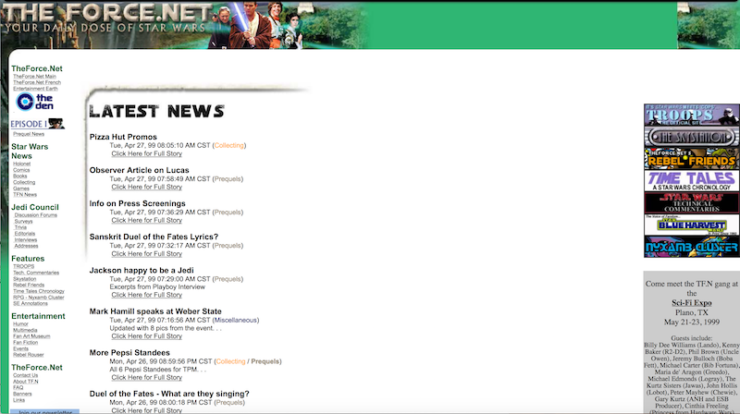
Soon the end of a millennium was upon us, and the internet was steadily blooming into something that would take over most of our lives. But we weren’t at peak saturation yet. The Dot-com bubble and Y2K were close to exploding all over us (one of these would actually affect the timeline, the other would decidedly not), and CGI was quickly blowing its own bell curve in terms of believability. I watched movie trailers on QuickTime, and spent hours on fan sites with the same five pages and forums where you could talk to other anonymous friends. All parents were convinced that their children were going to be kidnapped by people from chat rooms. My mother didn’t realize that the sort of predators she was worried about didn’t tend to show up on TheForce.net.
So what made 1999 different? It was a level of saturation (and sometimes of quality) that made it clear to my twelve-then-thirteen year old brain that the things I adored were about to get mainstreamed, and fast. Imagine being twelve years old and suddenly the first season of Farscape and then a film called The Matrix get dropped on you like meteor. I had been waiting for Farscape, to be fair—the instant I saw the commercials for it, I was hooked on its possibility, and it never let me down. But The Matrix was something else entirely. That movie was an unqualified moment in science fiction cinema, heralding a near-decade period when geek guys were never found out in public without their black trenchcoats of varying fabrics. While I enjoyed the film thoroughly, it was a little too grim to grab me quite as hard as it did for so many. But it led to the strangest change of all: people who thought I was incredibly weird suddenly wanted to talk to me, specifically about that movie.
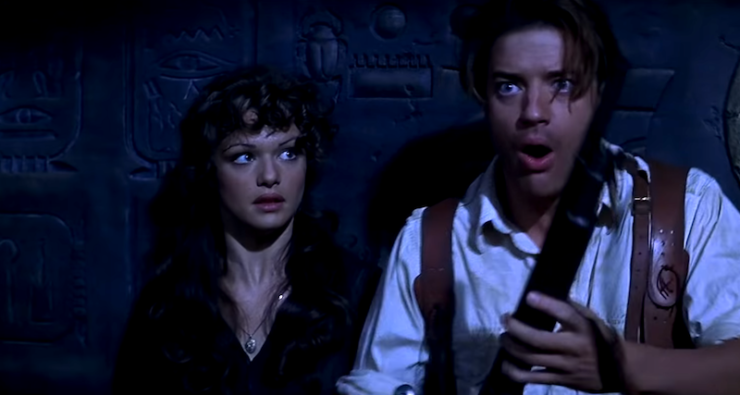
The Mummy arrived in May and promptly took over my brain. (It was a banner year for Brendan Fraser, between that, Blast From the Past, and Dudley Do-Right.) It glorified camp in a way that was very much My Thing, and I went to the theater to watch it again several times. The saddest thing about The Mummy to my mind is that no film since has replicated such a winning formula for action flicks; in the new millennium, action moved further into the realm of realism and lost a lot of that awkward delight and over-the-top pomp. (The Fast and Furious franchise qualifies for some of this, but it’s considerably more Tough Guy than The Mummy was trying to project.) I probably listened to that Jerry Goldsmith soundtrack one hundred times in one month on my skip-resistant Discman. It seemed like an embarrassment of riches already, but it couldn’t quash my need for Star Wars: Episode I—soon to be one of the most derided films of all time.
Here’s the thing about being a kid when bad movies come out: if it’s a thing you adore, it can be really easy not to care how mediocre it is. All the chatter about it how it “ruined Star Wars” never mattered to me. I got a Star Wars movie in 1999, and that was what mattered. Said Star Wars movie got me to dress up as Obi-Wan Kenobi for a movie release, and that was what mattered. A new Star Wars movie meant that kids who knew nothing about Star Wars were constantly asking me for context, and that was what mattered. Star Wars was firmly reintroduced to world again, and I had more to look forward to. That was all that mattered.
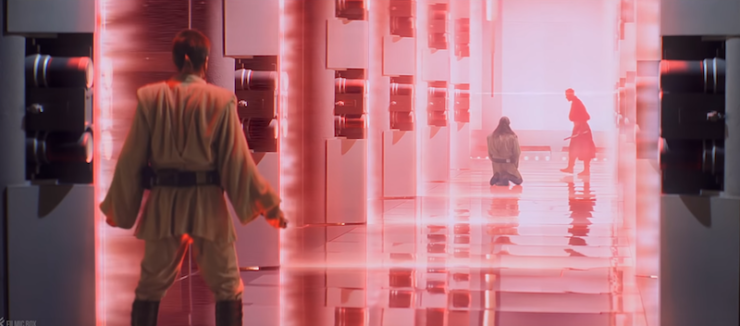
I noticed the horror genre was trying some new tricks on for size, too. The first half of the year I couldn’t turn my head without seeing some form of viral marketing for The Blair Witch Project. (Do you remember how the IMDb page for the film listed the actors as “Missing, Presumed Dead” for the longest time?) Some people got taken in enough that they bought it, thought they were looking at actual found footage from some poor dead teenagers who got lost in the woods. The film’s ad campaign jump-started a new era in meta marketing, immersive and fully aware of the power of the internet. There was a “documentary” on the SciFi Channel that further built upon the legend of the area, something that I kept flipping back and forth to while channel surfing. It never occurred to me that this would become a roadmap for everything from low-budget oddities to Batman movies, harnessing the natural curiosity of fans the world over.
In 1999, my thirteenth birthday fell on the day that three different SFF movies were released: The Iron Giant, Mystery Men, and a little Shyamalan film called The Sixth Sense. I chose to see Mystery Men on that day, perhaps the least remembered of the three (which is wrong, that movie is beautiful). But The Iron Giant snared countless hearts that year, and The Sixth Sense was just like The Matrix—for a few months it was all anyone could talk about. Every single late night talk show and award ceremony had to do a parody of “I see dead people”, in Haley Joel Osment’s frightened little voice.
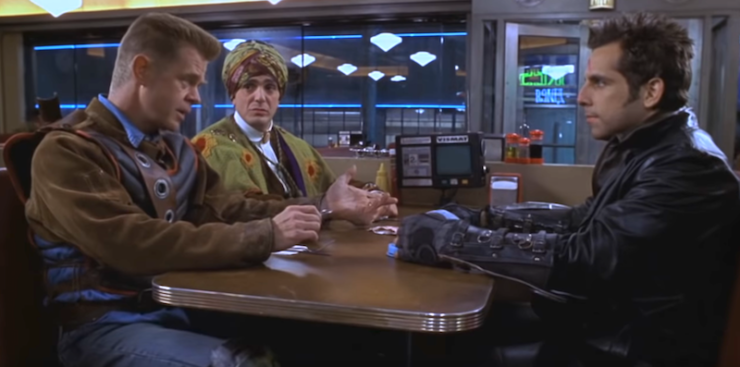
There were other weird standouts for me that year that I still can’t explain in terms of how well I remember them—The Haunting (a remake of the 1963 film of the same name, itself adapted from —but barely resembling—Shirley Jackson’s masterpiece The Haunting of Hill House), Bicentennial Man, Wild Wild West (I’m sorry, it stuck somehow), and Stigmata. And then there were some that I was too young to understand fully; eXistenZ was a bit beyond me, sad to say.
There were plenty of forgettable films, from Wing Commander to a cinema adaptation of My Favorite Martian, in case we were worried that SFF was leaving its B-movie roots behind.
One of the biggest award nominees of the year was a film based on Stephen King’s The Green Mile, and the adults around me talked endlessly of Michael Clarke Duncan’s moving performance.
As a fan of Tim Burton for basically my entire life, the arrival of Sleepy Hollow around Halloween felt like a glittering gift.
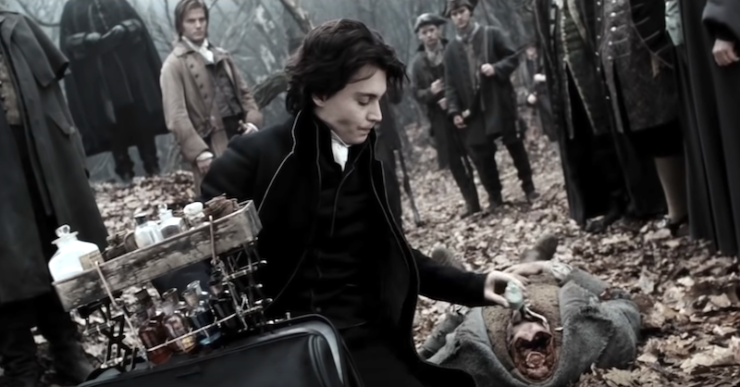
But perhaps that greatest portend of things to come happened on Christmas that year. My entire family woke up with a terrible cold that morning, and decided that we’d prefer to spend the day going to see a movie, forgoing the usual holiday complications and entanglements. On that that day, a little film called Galaxy Quest came out, and as a fan of Original Series Star Trek, that seemed as good a choice as any. My parents and grandmother and I sat down in a darkened theater and then never stopped laughing.
Looking back, Galaxy Quest was an omen, the truest harbinger of things to come. In a year full of renewed franchises, surprise hits, and silly revamps, here was a film that turned a metafictional eye on not only science fiction, but on fandom—the unsung engine behind every blockbuster smash and cinematic universe. Galaxy Quest is a film where the passion of fans is ultimately what saves the day, in a narrative that gives them that heroic sponsorship without condescension or belittlement. In effect, 1999 ended on this movie. It ended on a message that spoke to the power of fans and the power of science fiction when appreciated and harnessed by the people who loved it most.
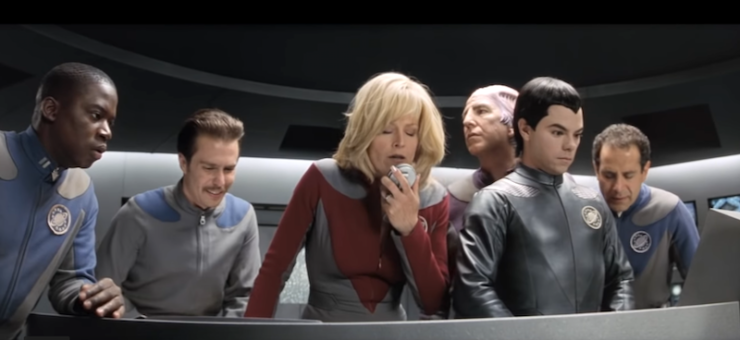
When I was thirteen, I didn’t really get that. But I did know that if those awkward kids who adored the Galaxy Quest TV show were heroes, then this movie thought that I could be one too. I knew that what I loved was being embraced on a level I had never seen before. I knew that there was something deeply powerful about the excitement I was witnessing. And I knew that 1999 felt very different from the years proceeding it.
These days, being a nerd is something altogether different. It’s expected, maybe even “normal” to a certain degree of obsession. It’s all around us, and getting harder to keep track of all the mediums, stories, and universes. But I remember when that train picked up steam. Before anyone guessed what was coming. And I’m still awed by what I saw, twenty years down the line.
Emmet Asher-Perrin will never stop inducting children to the wonder of The Mummy. You can bug him on Twitter, and read more of her work here and elsewhere.










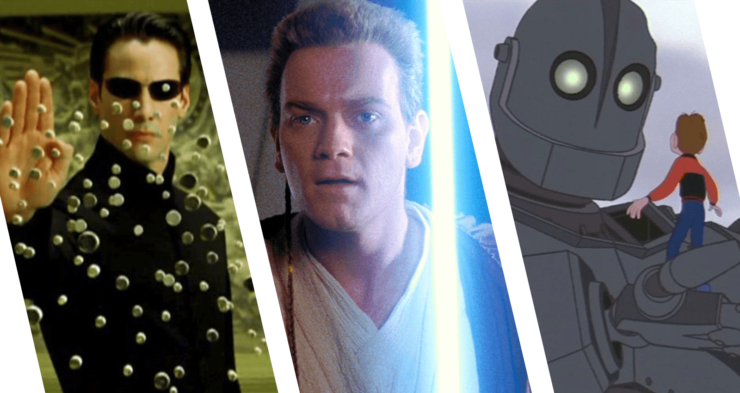




What you are describing is the year nerd culture is more like…
https://www.youtube.com/watch?v=MpraJYnbVtE
As someone who was an adult long before this point, I’d say the turning point was when STAR WARS movies became available to families in their homes. Kids who grew up watching STAR WARS and other sf/fantasy entertainment turned what was a genre for outsiders into mainstream and extremely lucrative entertainment.
For me it was 1977. I had seen Star Trek reruns, Lost in Space, the Time Tunnel (anybody remember that one?), the 1960s Batman series, the Green Hornet and Space:1999 on TV. I had played D & D (the paper back rules, before A D & D of any edition). I had played Avalon Hill board games. In other words I was a nerd before the word was invented. But Star Wars was so big that my hardcore capitalist friend told us that 20th Century Fox’s stock had shot up. To see that opening shot in a real theater (not the shoeboxes of today) just blew your mind. Maybe 1977 didn’t have the volume of 1999 but…
1999 was a vision of the future, alright, when there are so many nerd events throughout the year they just kind of wash over you in a wave of meh. Sorry, there are still some gems out there, no doubt, but how can we get excited to see the big top rising up anymore? The circus never leaves town!
I think a lot of us have had experiences similar to what Emily describes, with a variety of movies and books marking the drift of the world at large toward geekdom. I am the son of an SF fan, so I grew up geeky. It has been very enjoyable for me to have the world heading in the direction of the things I love.
My husband argues that nerddom tipped into the mainstream when people began to realize that the weirdos with the glasses and the ill-chosen clothes and the strange speech patterns and the interest in unmanly things like circuit boards were getting rich and still looking and talking like nerds.
This points up the strong presence of autistic people in nerddom, because being enthusiastic about the wrong things, or in the wrong way, is an autistic marker just as much as having off-kilter speech patterns or peculiar dress sense or not realizing that you’re being laughed at.
I think that the first sign that the Great Mainstreaming had already happened was the time that some big company (I forget what it was) put a D&D 3.5 DMG under the arm of the nerdy character in their commercial and had him “get the girl” without adding either an explanation of what the book was or a stinger in which he did not “get the girl.” What a far cry from that MTV ad in the early ’80s that was nothing, nothing at all, but an obviously (in hindsight) autistic man driving his van while talking about how he prefers polyester clothing. His existence was the punchline. “Watch MTV in order to mark your difference from this outcast” didn’t even have to be spelled out.
Are you mocking us? :p
nerd culture, i’d say it back with the first star wars movie
1999 was, overall the best year ever for sf and fantasy films. I said that at the time, and I still think it’s a contender today. The breadth and depth of the material was just amazing. You hit almost all the films of which I have the fondest memories (and I agree about “Mystery Men”), but there’s one major omission. 1999 gave us the first feature film from two of the great mad geniuses of the field, “Being John Malkovich” by screenwriter Charlie Kaufman and directory Spike Jonze.
This is like reading someone narrating my life. TheForce.net, QT movie trailers, Cheat Code Central, getting the newest ‘behind the scenes’ image on starwars.com for the upcoming Ep 1, Pokemon cards and Star Wars CCG with my friends, this was most of what I did outside of school. And I completely agree, Mystery Men is a wonderful movie. That DVD was one of my prized possessions back in the day.
I was born in the ’60s and have felt for some time like 1999 was the peak of ‘my’ nerd culture. I would also cite the debut of Futurama that year as further evidence of my half baked claim.
I was 14 in 1977. I’d already had Planet of the Apes, Silent Running, Logan’s Run, 2001: A Space Odyssey, UFO, Space: 1999, and of course Star Trek reruns, but there wasn’t all that much of all that. I’d also read The Chronicles of Narnia, some Alan Garner, Lloyd Alexander’s Chronicles of Prydain, and JRR Tolkien’s Hobbit and Lord of the Rings, but there wasn’t much in the way of fantasy on store bookshelves. Then in 1977 there was Star Wars, which kids who couldn’t care less about Star Trek loved, and then (and not unrelated) there was Del Rey Books, starting their line with the Star Wars novelization movie tie-in edition and Terry Brooks’s The Sword of Shannara. Star Wars and Shannara were carried as comic strips in the local paper. In the summer of 1977 people who barely knew the difference between Sulu and Chekov and couldn’t spell Asimov or Heinlein were swapping Star Wars bubble gum cards. Things changed — a lot.
Basically, there have been many 1999s. Your 1999 depends on how old you are.
I was 30 in 1999.
I remember it as a platinum year for movies in general, much like 1939 was.
I haven’t been as clued-in to movies since I became a parent in 2004, so I can’t be sure, but I don’t think we’ve had a year of quality that was 1999’s equal since…
I think the only problem with this article is the title. 1999 for me would be considered the year Nerd culture took over for good. The year Nerd culture BEGAN taking over was far earlier than this. 1977 with the release of Star Wars might be one start, although I’d say 1984 was the true kick off for the nerd revolt that came.Ghostbusters, In movies, we had Gremlins, the first Terminator, the second Indiana Jones film, Bladerunner, and of course the aptly named Revenge of the Nerds. Nerd music was hot (Devo, Flock of Seagulls, Weird Al). In computers, 1984 saw the release of Apples “1984” commercial at the Superbowl, the launch of the MacIntosh, the launch of CD-ROMs, and IBM released the PC Jr. and PC / AT.
The dot.com rise and bust of the nineties was a symptom of the continual take over that started earlier. But for me, those roots began in the 1980’s, and 1984 in particular seems the right place to say that nerd culture thrust itself into the mainstream in a huge way.
Gee whiz, kid, you’re writing like 1984 never happened. Ghostbusters, Temple of Doom, Police Academy, Neverending Story, Sixteen Candles….I could easily keep going, but *that* was the year that the nerd came to the party and triumphed. Hell, even Revenge of the Nerds came out in 1984…
More like 1999 was the year you, personally, noticed popular nerd culture for the first time. It’s been around for decades, you were just noticing it more in 1999. 12/13 is when a kid starts to become more aware of the world outside of their own house. Nerd culture did not all of a sudden become big in 1999. More like mid-80’s when Star Wars was fully enmeshed in everyday, Star Trek: TNG lasted for years on basic TV, movies like Revenge of the Nerds, Spaceballs, Ghostbusters, video game console systems and the first computer games, etc. The 80’s had it all. Which is what makes Ready Player One so good (the book, not the movie) and nostalgic!
Maybe 1999 or whatever year the general culture started enjoying nerd/geek culture, but it’s been around a long time. Can you tell when a 2400 baud modem has successfully connected? Did you watch Dr. Who with the 4th doctor or earlier late night weekend on a PBS channel? What sci-fi and fantasy authors were the big ones you read as a kid? Hint – better include Heinlein and Asimov. Have you watched all of Blake’s 7? How many of these children understand the difference between a nerd and a geek? Though nerds tend to be geeks, and there are a lot of non-nerd geeks. And that’s just 70s and 80s nerds/geeks, the old men from the 50s and 60s will have a whole different set of criteria, like launching your first rocket, getting your ham radio license, etc. I do wish it was still all ours, though, reading translations of animes while watching them on LDs exported from Japan. Our escape from them, or place to be us. Now the jocks and preps and cliques think our stuff is cool. Meh. Frack off, posers. How many of you watched Babylon 5 all the way through? Played Axis and Allies? Role-played in a campaign of Paranoia? Get off my lawn! : )
It was 1977. Science fiction and other genres were due to first the 50s with Sputnik (I was a child of the Sixties), then (2) 1977 with Star Wars: A New Hope (though then it was just Star Wars).
A reminder people used to make fun of people for being smart.
Thanks for this article! I had not thought much about 1999, but it was indeed a pretty big year. I turned 27 that year, and perhaps I would have noticed it more had I been younger. I did get really excited for the release of Phantom Menace, and that is still the only time in my life I’ve gone to a midnight movie premiere, but I am to be counted among the disappointed after seeing it.
I also agree with other commenters about 1984 being big (I was 12 at the time). Blade Runner was actually earlier (1982), but 1984 was the year that Dune was released, and I had just read that book when I saw the movie.
Also have to give a shout out to 1985, which not only had Back to the Future, Teen Wolf, Explorers, and My Science Project, but also a couple of my all-time faves: Enemy Mine and Brazil. Oh, and Real Genius came out that year as well, if that counts as a genre film.
Judging by the list of highest-grossing films over the years, it would seem SciFi/ fantasy had been seeping into the mainstream for quite a while:
https://en.wikipedia.org/wiki/List_of_highest-grossing_films#High-grossing_films_by_year
@18,
They still do. Indeed, I think in at least one country, being willfully ignorant has been demonstrated as an effective strategy to get elected to high office.
1966. My dad was an SF fan, home on Tuesday nights (normally worked swing shift, and you had to wait till summer for reruns). Star Trek hit (along with Lost in Space which was considered humor at my local junior high). I don’t know how many girls took calculus later on just so they would feel inside that Mr. Spock would approve of them, but I can tell right now it was more than zero.
It’s a function of age. In my case, the banner years were 1966 to 1968, starting with the whole family watching Star Trek every week on a black and white TV. My father so anticipated the arrival of 2001 A Space Odyssey, that he took the entire family to not one, but two separate Cinerama films (the 1960s equivalent of IMAX) to prepare us for the spectacle. 2001 did not disappoint, projected on a screen via three 70mm projectors, followed just a year later by the real moon landing.
My parents were original Black nerds, they met while both were graduate researchers at MIT in 1952, Mom was a “computer” calculating missile trajectories and Dad was a microwave engineer working on the guidance system for an early air to air missile. They other thing about 1968 was that it was the first time I actually touched a real “computer” (aside from my Mom), a Nixie-tube equipped desk-sized Wang calculator programmable via punch cards. My mother was, by then, a math teacher and ran the math lab at our local middle school, so when I was a being bit too disruptive (much of the time), my teachers would send me to the math lab. I still spend most of my time programming computers 50 years later.
I wonder if the author knows their profile page has some pronoun confusion “He lives in Brooklyn with her lovely partner.”
Aah, yes: the remake of My Favorite Martian. I loved that movie.
This probably shreds my rather dubious intellectual cred, and does little to my aura of sophistication. Too bad.
I loved the original TV My Favorite Martian, which makes me old as well as dubiously intellectual and doubtfully sophisticated. :-D
I was 16 in 1999, and a sophomore in high school. Thank you for this articile. This and the early 2000s (my early college years) really were a great time to be a geek – aside from the Star Wars resurgence, we had the upcoming Lord of the Rings and Harry Potter movies to get excited about too.
Galaxy Quest and Sleepy Hollow are also still among my favorites :)
Like 11, 13 and 15 say. I feel like this post is a classic example of the old joke about “the Golden Age of science fiction is twelve”…
For me, the mid eighties were when nerd culture began to take over the world. You had Star Wars: Return of the Jedi, sure, and ET, but it seemed like every big entertainment property had genre roots. Ghostbusters and Aliens and the Terminator films were huge. Star Trek was on the big screen as well. Schwarzenegger was a star entirely because he came up through genre – Conan, Terminator, Predator. So was Sigourney Weaver. Cinema stopped being made by artistes for critics and started being made by nerds for nerds. Fantasy roleplaying games were taking off with colossal speed. Home computers and computer games were just getting going.
But I’m sure if I was a nerd in my silver years, I’d be sitting here saying “No, no, the sixties! When you had Apollo, and Captain Kirk, and Buck Rogers, and the pulp magazines! When scientists and pocket-protector engineers were heroes and every kid wanted model supersonic jets!”
And if I was his dad I’d be saying “no, the 1940s! When you couldn’t make a war film without the boffins in the back room coming up with the secret weapon that would beat Hitler! Radar and bouncing bombs and death rays! Superman and Bat-Man first appeared in comics!”
And his father in turn would be talking about HG Wells and Gernsback and John W Campbell and Astounding SF…
I’ll go back farther than any of you: nerd culture began its slow takeover in 1957, when Sputnik demonstrated that you needed mire of those kids in the science classes because the jocks and cool kids weren’t going to win a space race or, during the Kennedy administration, put an American on the Moon